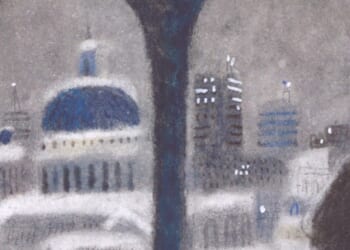THE other evening, Maggie and I went to Binham Priory to see, of all things, a production of Ruddigore, set amid the ruins. It was an unlikely combination of two pleasures so distinct that one might have thought them mutually exclusive.
One of these was meditation at sunset among the beautiful remains of a religious house — ruins that speak of the fissures and severances of our religious history, and yet also of the continuity of Christian worship over the centuries; for, even after the dissolution and destruction of the extensive priory buildings, in 1539, the nave of the old priory church remains intact and roofed, and is still used as the parish church.
The other was the pleasure of a distinctly English, and decidedly High Victorian, genre of musical satire, with its mock-solemn, skilful silliness, its exuberant inanity: all the jokes and absurdities of Gilbert and Sullivan, as wonderfully presented that night by the Cambridge University Gilbert and Sullivan Society.
It was all great fun, of course, a witty send up of Gothic romance, with all the main features present and correct: an inherited family curse, an innocent would-be bride, a jilted madwoman, and ghostly ancestors stepping down from portraits to haunt the present holder of their title: the wonderfully named Sir Ruthven Murgatroyd. And, as always, it was as much the Victorian conventions as the tropes of Gothic romance which were satirised and turned on their heads. What if the stern call of duty turned out not to be “the trivial round, the common task”, but a call to criminality? So the ancestral curse stipulates:
Each lord of Ruddigore,
Despite his best endeavour,
Shall do one crime, or more,
Once, every day, forever!
Suddenly, the shirking of duty becomes a virtue! Then there was the tongue-twisting verbal dexterity of the patter song. Whichever operetta these songs are in, they all go to the rhythm of “I am the very model of a modern Major-General.” Indeed, Gilbert emphasises his own nonsense in the Ruddigore patter song, as we strained to hear the words:
This particularly rapid, unintelligible patter
Isn’t generally heard, and if it is it doesn’t matter.
And what of hearing it all at Binham? Well, one might say, what better background for these spoof Gothicisms than a genuine Gothic ruin? The programme notes made much of the parallel between the supposedly “scandalous behaviour” of the priors and the “bad baronets of Ruddigore”.
But I was less inclined to run down the well-worn grooves of Protestant propaganda, and my reflection on the setting was, first, that Binham Priory is a living church as much as a ruin, and that it is doing just what a living church should do: making a place and space for the arts, offering a venue to musicians, actors, and singers, without being overly judgemental, or prescribing what they do.
Satire is a moral art: it cannot criticise the crooked without some idea of the straight. And, when the ancestors stepped out of their picture frames to urge their descendant on to crime, I thought of its parallel and opposite: the great cloud of witnesses, the saints, our spiritual forbears, who lean out towards us from their icons and encourage us to just those radical acts of virtue which subvert, and may even seem to satirise, the conventions of worldliness.
The Revd Dr Malcolm Guite is keynote speaker at “Finding Inspiration in the Psalms”, on 2 October in York. Visit here for more details and tickets.
















